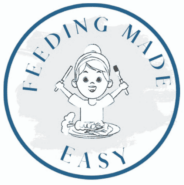You may have heard the phrase “food before one is just for fun.” It’s a really cute rhyme and has good intentions, but is a bit misleading. While it is true that most of your baby’s nutrition should still be coming from breastmilk or formula until around age 1, there is still a reason we focus a lot on the first foods we introduce to our kids.
This post may contain affiliate links and when you click on the links I may earn a small commission at no charge to you. As an Amazon affiliate, I earn a commission from qualifying purchases.
Iron
Iron is probably the number 1 nutrient we focus on when starting solids. Most babies who are born at term will have adequate iron stores to last them around 6 months. After this, the amount that we find in breast milk and formula isn’t enough to meet their needs. It’s why iron fortified cereals were recommended for so long and now we recommend iron-containing foods in general.
Motor Development
Eating is a complex process. Your child needs to be able to look at the food, grab it, bring it to their mouth, chew/mash it, form a bolus, and swallow it. They need to do all of this while maintaining a seated position, which they probably just figured out how to do. In addition to floor time, eating provides a lot of opportunity for supervised practice for many different motor skills.
Allergy Introduction
While the research is new (and mostly limited to peanuts and eggs), it appears that introducing allergens early seems to be protective. Kids introduced to the top allergens later are at a higher risk for developing food allergies. This does not mean that all kids exposed early will not develop food allergies or all kids with delayed introduction will develop allergies. It just means that there’s an increased risk with delaying introduction.
Texture Introduction
Kids who are exposed to new textures later than around 9 months or so are associated with increased feeding difficulties (1). This can mean increased pickiness or troubles tolerating different textures. This is why no matter how you start solids (purees or BLW), we recommend advancing past purees by 9 months.
It can take a lot of practice and learning to go from an all liquid diet to an all solid diet. This transitional period from 6 months on is really needed to give your baby time to learn the new skills required to eat while they are still receiving some of their nutrition from breastmilk or formula.
Zinc
In addition to iron, babies need zinc. You may not hear as much fuss about zinc, because many iron containing foods also contain zinc. By focusing on iron, you can usually get enough zinc.
Sensory Development
While learning to process different textures is part of your child’s sensory development, eating requires use of all of our senses. As with everything, kids need practice to help develop these senses. Kids with different sensory needs may need additional support and often some of these needs become first obvious during eating.
Food Before One Should Be Fun
It just shouldn’t ONLY be fun. Kids tend to learn best through play. It’s one of the reasons that we recommend food play for picky eaters. It helps them to learn about new foods in a way that is comfortable for them. Making mealtime fun should be a goal, but it is also important to keep in mind that it’s not the only goal.

Krystyn Parks is a Registered Dietitian and Lactation Consultant who specializes in feeding children. She has a Master’s Degree in Nutritional Science from California State University Long Beach. She is an International Board Certified Lactation Consultant and has been registered with the Commission on Dietetic Registration since 2013.
